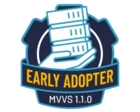We have hundreds of desktops running wIntegrate version 6.4.4. After migrating to RHEL we want to find an easy method to enable SSO for all our desktops with wIntegrate.
We would like to run an automated script (using powershell or something) to update all our desktops so we don’t have to update each desktop individually, but the manual states that you cannot edit the session .wic files with a text editor because the files are in a binary format… that you need to use the wIntegrate Editor to edit the .wic files. This doesn’t sound like something that can be easily automated.
We have experimented with using a text editor (Notepad++) to update a .wic file before, and wIntegrate seems to properly recognize the changed setting... so it seems feasible that an automated powershell script could find and update all .wic files with a new setting.
Has anybody else had success updating settings in a wIntegrate .wic session file without using the wIntegrate editor to compile the .wic file?
We specifically want to set GSSAPIAuthentication=1 in the .wic file.
Thanks in advance.




